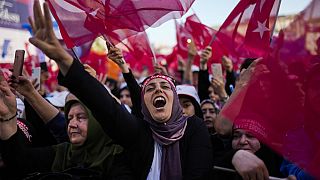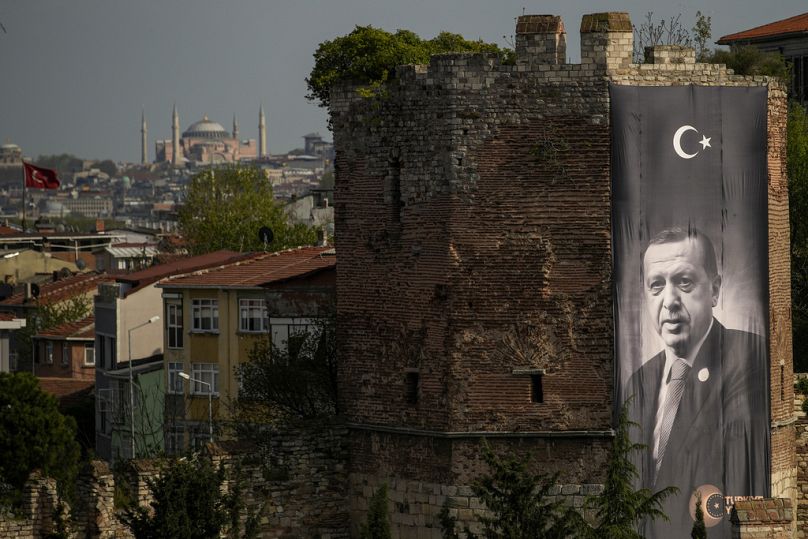EURONEWS
As Turkey heads to runoff presidential race, domestic issues loom large

Erdogan, who has amassed greater powers during his 20 years in office, finished a first-round election on May 14 just short of a victory and also retained a
Erdogan, who has amassed greater powers during his 20 years in office, finished a first-round election on May 14 just short of a victory and also retained a majority in parliament, despite rampant inflation and the aftermath of a catastrophic earthquake that killed more than 50,000 people.
Turkish President Recep Tayyip Erdogan, who has parlayed his country’s NATO membership and location straddling Europe and the Middle East into international influence, is favoured to win reelection in a presidential runoff Sunday, despite a host of domestic issues.
On the final day of his campaign, in an attempt to rally his conservative base, Erdogan paid homage to his executed Islamic predecessor, Adnan Menderes.
Menderes was tried and hanged one year after the military staged a coup in 1960 to put Turkey back on a more secular course. Erdogan survived a putsch attempt against his own Islamic-rooted government in 2016.
While Erdogan's first decade in power was distinguished by strong economic growth and warm relations with Western powers that elevated his global status and domestic support, his second began with a corruption scandal and soon descended into a political crackdown and years of economic turmoil that erased many of the early gains.
Sunday's vote comes amid growing fears about the future of Turkey's beleaguered lira, the stability of its banks, the refugee crisis and women's and LGBTQ+ rights.
The failing Lira
Erdogan has forced the central bank to follow through on his unconventional theory that lowering interest rates would bring down inflation – and the exact opposite has occurred.
Turkey's annual inflation rate touched 85% last year, while the lira entered a brief freefall. Yet the currency has been holding remarkably steady during the campaign period, a sign that the government is ploughing vast sums into market interventions.
Meanwhile, the central bank's net foreign currency holdings, a key measure of financial health, have dropped into negative territory for the first time since 2002.
Economists feel that Erdogan's government will need to reverse course and sharply raise rates or stop supporting the lira if it wants to avoid a full-fledged crisis after the vote.
"If Kilicdaroglu were to win, he would immediately establish a more austere monetary policy than that of Erdogan," Moneyfarm investment house's Giorgio Broggi said.
Can Kilicdaroglu still win?
Erdogan ended up beating secular opposition leader Kemal Kilicdaroglu by nearly five percentage points two weeks ago.
But his failure to top the 50% threshold triggered Turkey's first-ever election runoff and underscored that support for its longest-serving leader is gradually ebbing away.
Kilicdaroglu has focused his campaign on more immediate concerns as he tries to come from behind and restore the secular party that ruled Turkey for most of the 20th century back to power.
He used a late-night TV interview on Friday to accuse Erdogan's government of unfairly blocking his mass text messages to voters.
"They are afraid of us," the 74-year-old former civil servant said.
The episode highlights tallies with what opposition supporters, many of them liberal secularists in big cities such as Istanbul and Izmir, have been saying for years. And while the election day polls were judged to be free, observers say they were hardly fair.
"These were competitive but still limited elections," the Organisation for Security and Cooperation in Europe (OSCE) election observer mission's chief Michael Georg Link said after the first round.
"The criminalisation of some political forces, including the detention of several opposition politicians, prevented full political pluralism and impeded individuals' rights to run in the elections."
Kilicdaroglu promised support for low-income families if he was elected president at the Family Support Insurance Meeting on Saturday.
"The State deposits money into the bank account for every family that has no income or whose income is below the minimum wage," he said in Ankara. "The woman goes and withdraws that money like a pensioner, a worker, or a civil servant, and provides sustenance for her children.
"Therefore, no one knows that that family is poor, earning less and that family is in need of income. Only the social state knows this. I’m offering my most sincere regards to all of you.
"Thank you, and be in the palm of Allah. Conserve the ballot boxes."
Turkey's catastrophic earthquake
All the while, Turkey is grappling with a difficult recovery from February's 7.8 magnitude earthquake, the deadliest quake in the country's modern history.
It destroyed or damaged more than 300,000 buildings. Hundreds of thousands of residents are still sheltering in temporary accommodation like tents, and some 658,000 people were left jobless, according to the International Labor Organisation.
The World Bank estimates that the earthquake caused 31.68 billion euros in “direct damages”, an amount equivalent to 4% of Turkey's 2021 gross domestic product.
The recovery and reconstruction costs could add up to twice as much, the international financial institution said.

No comments:
Post a Comment